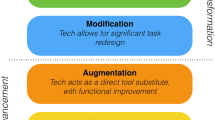Abstract
This paper reports on a series of interventions in New Zealand schools in order to enhance the teaching of, and learning in, technology as a new learning area. It details the way in which researchers worked with teachers to introduce technological activities into the classroom, the teachers' reflections on this process and the subsequent development of activities. These activities were undertaken in 14 classrooms (8 primary and 6 secondary).
The research took into account past experiences of school-based teacher development and recommendations related to teacher change. Extensive use was made of case-studies from earlier phases of the research, and of the draft technology curriculum, in order to develop teachers' concepts of technology and technology education. Teachers then worked from these concepts to develop technological activities and classroom strategies. The paper also introduces a model that outlines factors contributing to school technological literacy, and suggests that teacher development models will need to allow teachers to develop technological knowledge and an understanding of technological practice, as well as concepts of technology and technology education, if they are to become effective in the teaching of technology.
Similar content being viewed by others
REFERENCES
Ball, S. J. & Goodson, I. F.: 1985, ‘Understanding Teachers: Concepts and Contexts’, in S. J. Ball & I. F. Goodson (eds.), Teachers’ Lives and Careers. Lewes, Falmer Press.
Bell, B. F.: 1993, I know about LISP but how do I put it into practice? Final report of the Learning in Science Project (Teacher Development). Centre for Science and Mathematics Education Research, University of Waikato, Hamilton.
Claxton, G. & Carr, M.: 1991, Understanding Change: The Personal Perspective. SAME papers 1991, Centre for Science and Mathematics Education, University of Waikato, Hamilton, pp. 1-14.
Dalin, P.: 1978, Limits to Educational Change. Macmillan Press, London.
Fullan, M. G.: 1993, Change Forces: Probing the Depths of Educational Reform.The Falmer Press, London.
Fullan, M. G. & Stiegelbauer, S.: 1991, The New Meaning of Education Change.Teachers’ College, New York.
Gilbert, J.: 1994, ‘The Construction and Reconstruction of the Concept of the Reflective Practitioner in the Discourses of Teacher Professional Development’, International Journal of Science Education 16(5), 511-522.
Goodson, I. F.: 1985, ‘Subjects for Study’, in I. F. Goodson (ed.), Social Histories of the Secondary Curriculum. Lewes, Falmer Press.
Jones, A. & Simon, S.: 1991, Strategies for educational change: the work of the OPENS project in the context of a new national curriculum for science SAME papers, Centre for Science and Mathematics Education Research, University of Waikato, Hamilton, pp. 15-35.
Jones, A. T. & Carr, M. D.: 1992, ‘Teachers’ Perceptions of Technology Education: Implications for Curriculum Innovation’, Research in Science Education 22, 230-239.
Jones, A. & Carr M. D.: 1993a, Towards Technology Education. Vol. 1: Working papers from the second phase of the Learning in Technology Education Project. Centre for Science, Mathematics and Technology Education Research, University of Waikato, Hamilton.
Jones, A. & Carr, M. D.: 1993b, Analysis of student technological capability. Vol. 2: Working papers from the second phase of the Learning in Technology Education Project. Centre for Science, Mathematics and Technology Education Research, University of Waikato, Hamilton.
Lave, J.: 1991, ‘Situated Learning in Communities of Practice’, in L. B. Resnick, J. M. Levine & S. D. Teasley (eds.), Perspectives on Socially Shared Cognition. American Psychological Association, Washington.
Miles, M. B. & Huberman, A. M.: 1984, Qualitative Data Analysis: A Source Book of New Methods. Sage Publications, Beverly Hills.
Mather, V. J.: 1995, Students’ Concepts of Technology and Technology Education: Implications for Practice.University of Waikato, Unpublished MEd Thesis.
Ministry of Education.: 1993, Technology in the New Zealand Curriculum (Draft).Learning Media, Wellington.
Paechter, C.: 1991, Subcultural Retreat: negotiating the Design and Technology Curriculum. Paper presented to the British Educational Research Association Annual Conference 1991.
Schön, D. A.: 1987, Educating the Reflective Practitioner. Jossey-Bass, San Francisco.
Shulman, L. S.: 1987, ‘Knowledge and Teaching: Foundations of the New Reform’, Harvard Educational Review 57(1), 1-22.
Van den Akker, J. J.: 1988, ‘The Teacher as Learner in Curriculum Implementation’, Journal of Curriculum Studies 20(1), 47-55.
Author information
Authors and Affiliations
Rights and permissions
About this article
Cite this article
Jones, A., Compton, V. Towards a Model for Teacher Development in Technology Education: From Research to Practice. International Journal of Technology and Design Education 8, 51–65 (1998). https://doi.org/10.1023/A:1008891628375
Issue Date:
DOI: https://doi.org/10.1023/A:1008891628375




